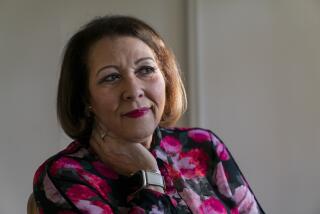Study to Focus on Elderly Women
- Share via
BALTIMORE — Researchers from the Johns Hopkins schools of medicine and public health are conducting a three-year study to determine what factors make elderly women’s health problems worse.
The Women’s Health and Aging Study will look at 1,000 Baltimore women age 65 or older who have health problems that require nursing care.
“We know that women who reach 65 can expect to live another 19 years, on average, and a significant number are disabled,” said Linda Fried, the study’s director. “The goal of the study is to determine what factors cause improvements and decline in the disabilities. With this information, we can begin to come up with effective interventions.”
The women, selected at random from Medicare recipient lists, suffer a range of disabilities--diabetes, Parkinson’s disease, cancer and arthritis.
“There hasn’t been a major study of this sort, so it’s of great importance,” said Ruth Bennett, deputy director of Columbia University’s Center for Geriatrics and Gerontology. “It is crucial that we learn what can be done to keep elderly people living independent lives.”
One likely participant in the study is 91-year-old Jennie Brown, a widow who lives alone and suffers from heart problems, hernias and poor hearing and eyesight.
Brown needs a nurse to help her bathe and dress. The state sends someone to her Baltimore apartment once a week to clean. Her daughter brings groceries and medicine and often moves in with her mother when she gets sick.
Society will save a tremendous amount of money if researchers can find a way to prevent elderly people from losing their ability to function independently, Fried said.
The number of elderly men and women needing help with daily tasks will likely reach 13.8 million over the next 40 years, according to the National Institute on Aging, which is funding the $7.9-million study.
An estimated 22% of women 65 or older are disabled. Those living at home often need the help of another person for dressing, eating, bathing and shopping.
The study is focusing on women because more than two-thirds of all disabled Americans over 65 are female, Fried said. But many of the study’s findings will be applicable to men, she said.
During the study, the women will be visited in their homes by interviewers who will determine how their disabilities and diseases have affected their daily lives. Other factors such as the death of a spouse, loneliness and aging will also be studied.
Nurses will perform 35 tests on participants, including electrocardiograms, visual and hearing assessments and neurology tests, said Susan Rogers, one of the nurses hired by Hopkins.
Health care for disabled, older Americans costs $65-billion annually, according to NIA statistics.
“The costs are going to continue to rise, since people over 65 are the fastest growing segment of our society,” Fried said.






